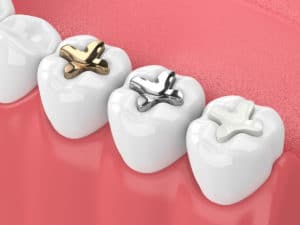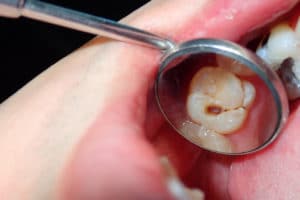Fix Any Tooth Decay Today At Our Office!
What Are Dental Fillings?
Patients from Edison, Metuchen, & South Plainfield, NJ, come into the dental clinics asking to have a dental filling procedure to solve their problems with tooth decay. When your tooth has decayed, your dentist prevents further damage by removing the decay, cleaning out the affected area, and putting a filling in the area where the decay used to be in order to restore normal function and normal tooth shape.
How Common Are Dental Fillings?
Getting a dental filling is the most common way of restoring teeth and it is important to seal or close off these areas where the decay was to avoid any further damage to the tooth. If a patient has a broken or cracked tooth, or a tooth that has broken down from excessive tooth grinding, getting a filling is also an option to restore the tooth.
What Are The Types Of Fillings That You Can Choose From?
Silver Amalgams
These are the most commonly used filling material and are made of 50% mercury mixed with silver, copper, tin, or zinc. This is the most popular type mostly because it is the least expensive compared to the other dental filling available in the market. With proper oral care, silver amalgams can last to as long as 10 years.
Composite Fillings
Composite fillings are popular with patients as well because it has a very high aesthetic value since its color is very close to tooth material. However, composite fillings are not as durable as silver amalgams and are more expensive.
Ceramic Or Porcelain Fillings
Both ceramic and porcelain fillings both durable and have high aesthetic value since the color is very close to matching the natural color of the patient’s tooth. These types of fillings may be expensive compared to the first two mentioned, but it is well worth it since porcelain resists stains and cannot be scratched easily like resin.

Glass Ionomers
Glass ionomers are made from a combination of acrylic and glass. This type of medical filling is not as durable and will last for less than 5 years. This is also the recommended choice for children since the glass ionomers are designed to release fluoride, which can improve the child’s oral health to strengthen and protect it against further damage.
Gold Fillings
Gold fillings are not so popular because it is the most expensive but dentists guarantee that it is sturdier, not corrosive, and can last for more than 15 years.
What Is A Dental Filling Procedure Like?
A local anesthetic will be applied to numb the area and the decay will be removed using a drill, air abrasion, or a laser. The decay will be removed and the dentist will make sure that the area is clean and no debris is left before filling the tooth. Your choice of filling is then put in and shaped and molded to look like your original tooth.
Patient Testimonial
“Dr. Messer: The confidence that I hold in your professionalism and efficient workmanship confirmed that traveling from Pennsylvania was worth it. Thanks again for living up to your reputation of “Gentle Dental Care”. As long as I am able to travel I will remain in your care. Please pass my thanks along to the staff. Will see you soon.” – Carolyn L. April 2004
How Often Does A Filling Need To Be Replaced?
It’s easy to assume once a tooth is filled the filling will last for decades. That can happen: silver amalgam and gold fillings can often last for decades. But that’s not the norm. Most fillings have a typical lifespan. Sometimes the filling breaks down with chewing forces over time. Sometimes the tooth matter surrounding the filling weakens and the filling becomes loose.
How Do I Care For Dental Fillings?
These are the durability/lifespans of the different types of fillings:
- Cast gold — Usually longer than 15 years.
- Silver amalgam — Usually last from 10-15 years but can last far longer.
- Tooth-colored composite — Usually last under 10 years.
- Ceramic — Usually last longer than 15 years, much like gold.
- Glass ionomer — Not made for durability due to use in children’s baby teeth. Last 5 years of less.

The best care for teeth with any type of filling is a regimen of attentive home hygiene and maintaining your twice-yearly professional exams and cleanings with the team at Gentle Dental. For your home oral care, you need to brush twice daily for two minutes using a toothpaste with fluoride. Floss once daily. It is also wise to use an antibacterial mouthwash at least once daily.
What Should I Not Do After Getting A Filling?
It’s a good idea to not eat any overly hard foods or foods requiring lots of chewing for the first 24 hours after we place your filling. This is especially true for silver amalgam fillings. With any filling, it’s also a good idea to chew on the other side away from the new filling for the first 24 hours after it is placed.
What Is The Benefit Or Reason For A Dental Filling?
At Gentle Dental, we place fillings to replace parts of a tooth we’ve had to remove due to decay. When bacteria have invaded either the enamel or the dentin of a tooth, they cause tooth decay. The portion of the tooth that is decayed must be removed to stem the progress of the bacteria. If the bacteria are not removed, the decay progresses until the bacteria enters the inner chamber of the tooth. When this happens, the bacteria now come in contact with the blood vessels and nerves within the tooth. This will usually cause extreme pain, and the tooth will now require a root canal just to save it. If the infection is left alone, it can cause an abscess and the infection can spread elsewhere in the body. Now the tooth will likely fall out.
Removing the decayed portion of the enamel or dentin stops the bacteria from causing more decay. Once the decayed matter is removed, a filling is used to occupy the space. That’s where the term “filling” comes from; it is filling the space left when the decayed tooth matter was removed. Fillings stem the progress of the decay and allow the tooth to remain strong for chewing and biting.
What Are The Signs That A Tooth Has Decayed And May Need A Filling?
Sensitivity and pain are the main signs that decay has invaded a tooth. There may be acute pain. Pain may come only when biting or chewing. Or the pain may be in the form of sensitivity to hot and cold foods or beverages.
These are the typical signs you need to come to see us at Gentle Dental because decay has taken hold in a tooth:
- Sensitivity to hot, cold, and sugary foods
- Pain when biting or chewing on a certain tooth
- General tooth pain
- A dark spot appears on the surface of a tooth
- Floss tears when pulled across a certain spot on a tooth
- Food becomes lodged in certain spots
- A previous filling has already fallen out

Is It Safe To Have A Filling Placed During Pregnancy?
At Gentle Dental, we occasionally have an expecting mom question whether or not she should have a filling placed during pregnancy. The answer is yes. In fact, all preventive dental work including twice-yearly professional cleanings and exams is not only safe but recommended. That’s because the rise in hormone levels during pregnancy causes the gums to swell, bleed, and trap food causing increased gum irritation.
Plus, preventive dental work, such as having decay removed and a filling placed, is essential to avoid oral infections such as gum disease, which has been linked to preterm births. Any dental work deemed necessary to reduce any possible spread of infection is a must. It will not have an adverse impact on the pregnancy.
Is There Recovery After Having A Dental Filling Placed?
Having a filling placed in a simple, quick procedure. The entire process takes around an hour in our Edison, New Jersey offices. Afterward, you may have some slight soreness in the area simply due to working on the tooth. This is not acute pain and is easily managed with over-the-counter pain medication. There is no real “recovery.” The only thing you’ll need to be cognizant of after getting a new filling placed or an old filling removed and replaced is to not chew overly hard foods on the new filling for the first 24 hours. That’s simply a precaution to allow the filling to fully anchor. This is typically more important with silver amalgam rather than composite resin fillings.
What Are The Risks Of Getting A Filling?
These are virtually risk-free procedures. We don’t enter the interior of the tooth. We simply remove the decay in the enamel or in the dentin and place a filling to replace the lost tooth matter. Because of that, there isn’t really any chance of infection or bleeding.
The real risk is not having your tooth decay removed and replaced with a filling. If left untreated, the decay will progress to the point where you will eventually lose the tooth.
Are Dental Fillings Painful?
Modern dental anesthesia makes the procedure of getting a feeling completely painless. You may have some slight soreness afterward for a day or so, but this, not acute pain. Any soreness is easily managed with over-the-counter pain medication.
Will Dental Fillings Ruin My Teeth?
No. Your dentist uses the utmost care and discernment when determining the best type of dental filling to successfully repair a damaged tooth. The purpose of a filling is to repair the damage that could ruin a tooth and cause a lot of discomfort in the process. Once you have your new filling, your tooth structure is restored to nearly 100 percent. The repaired structure should easily withstand the normal force of biting and chewing without compromising that tooth, nor the opposing tooth with which it comes into contact when you chew.
How Do You Prepare for the Dental Filling Procedure?
Before you see the dentist, it can be beneficial to gently brush your teeth. This maximizes the efficiency of your exam process. However, it doesn't necessarily make it easier for your dentist to spot a cavity. Tooth decay shows up on the x-rays that we take at the beginning of your appointment. If you need a filling, your dentist will very likely place your restoration during the same appointment without you needing to take special precautions ahead of time.
How Long Do Dental Fillings Last?
The lifespan of a dental filling depends on several factors. These include the material from which the filling is made, your oral care habits, and whether or not you bite on hard objects or clench your jaw when you sleep. On average, a filling may last about 10 years. However, more specifically, a filling may last as few as five years or it may last more than 15 years. When you visit our friendly office for restorative care, your dentist will discuss your options, the pros and cons of each, and how you can best care for your chosen type of dental filling so that it can last as long as possible.
Am I an Ideal Candidate for Dental Fillings?
If you have a cavity that is not too large, you are a good candidate for a dental filling. Larger cavities require more substantial restoration, which may be achieved with an inlay, onlay, or dental crown. Dental fillings are a necessary form of care that is intended to repair damage and also fortify the tooth against further injury.
Why Choose Gentle Dental Care for Your Dental Fillings
Gentle Dental Care in Edison, NJ offers clinical care in an environment that feels warm and welcoming. Our experienced team of dentists performs dental fillings, and all aspects of dentistry, with an abundance of compassion and knowledge. Through years of practice, each of our dentists has developed their own techniques for maintaining patient comfort and peace of mind, which we value as much as you do. When you visit us, you can expect clear communication, time spent listening to your concerns and answering your questions, and a thorough explanation of your proposed treatment plan. We want you to feel empowered in your oral health, and we look forward to serving you!



